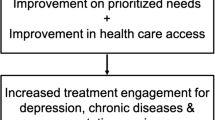Abstract
Despite increasing consensus about the value of depression disease management programs, the field has not identified which stakeholders should absorb the relatively small additional costs associated with these programs. This paper investigates whether two proposed stakeholders (health plans and employer purchasers) economically benefit from depression care management (reduced outpatient utilization and work costs, respectively) in two delivery systems (rural and urban). This study examined the main and differential effects of depression care management on outpatient utilization and work costs over 24 months in a preplanned secondary analysis of 479 depressed patients from rural and urban primary care practices in a randomized controlled trial. Over 24 months, the intervention did not significantly reduce outpatient utilization costs in the entire cohort (−$191, 95% confidence interval (CI) = −$2,083 to $1,647), but it did decrease work costs (−$1,970, 95% CI = −$3,934 to −$92). While not statistically significant, rural–urban differences in work costs were in the same direction, while rural–urban differences in utilization costs differed in direction. These findings provide preliminary evidence that employers who elect to cover depression care management costs should receive comparable economic benefits in the rural and urban employees they insure. Given the limited sample size, further research may be needed to determine whether health plans who elect to cover depression care management costs will receive comparable economic benefits in the rural and urban enrollees they insure.
Similar content being viewed by others
References
Rost K, Pyne JM, Dickinson LM et al. Cost-effectiveness of enhancing primary care depression management on an ongoing basis. Annals of Family Medicine. 2005;3(1):7–14.
Simon GE. Cost-effectiveness of a collaborative care program for primary care patients with persistent depression. The American Journal of Psychiatry. 2001;158:1638–1644.
Liu CF, Hedrick SC, Chaney EF, et al. Cost-effectiveness of collaborative care for depression in a primary care veteran population. Psychiatric Services. 2003;54:698–704.
Simon GE, Manning WG, Katzelnick DJ, et al. Cost-effectiveness of systematic depression treatment for high utilizers of general medical care. Archives General Psychiatry. 2001;58:181–187.
Schoenbaum M, Unutzer J, Sherbourne C, et al. Cost-effectiveness of practice-initiated quality improvement for depression: results of a randomized, controlled trial. Journal of the American Medical Association. 2001;286:1325–1330.
Bachman J, Pincus HA, Houtsinger JK, et al. Funding mechanisms for depression care management: opportunities and challenges. General Hospital Psychiatry. 2006;28(4):278–288.
Simon GE, Revicki D, Heiligenstein J, et al. Recovery from depression, work productivity, and health care costs among primary care patients. General Hospital Psychiatry. 2000;22:153–162.
Simon GE, Katzelnick DJ. Depression, use of medical services and cost-offset effects. Journal of Psychosomatic Research. 1997;42:333–344.
Von Korff M, Katon W, Bush T, et al. Treatment costs, cost offset, and cost-effectiveness of collaborative management of depression. Psychosomatic Medicine. 1998;60:143–149.
Rost K, Smith JL, Dickinson M. The effect of improving primary care depression management on employee absenteeism and productivity: a randomized trial. Medical Care. 2004;42(12):1202–1210.
Lo Sasso AT, Rost K, Beck A. Modeling the impact of enhanced depression treatment on workplace functioning and costs: a cost–benefit approach. Medical Care. 2006;44(4):352–358
Simon GE, Katon W, Rutter C, et al. Impact of improved depression treatment in primary care on daily functioning and disability. Psychological Medicine. 1998;28:693–701.
Wells KB, Sherbourne CD, Schoenbaum M, et al. Impact of disseminating quality improvement programs for depression in managed primary care: a randomized controlled trial. Journal of American Medical Association. 2000;283:212–220.
Zhang M, Rost KM, Fortney JC. Depression treatment and cost offset for rural community residents with depression. Journal of Social Service Research. 1999;25:99–110.
Rost KM, Zhang M., Fortney JC, et al. Expenditures for the treatment of major depression. American Journal of Psychiatry. 1998;155:883–888.
Miranda J, Schoenbaum M, Sherbourne C, et al. Effects of primary care depression treatment on minority patients’ clinical status and employment. Archives General Psychiatry. 2004;61(8):827–834.
Gale F. The Rural–Urban Gap in Manufacturing Productivity and Wages: Effects of Industry Mix and Region. Available at: http://ideas.repec.org/p/wop/censes/97-6.html (Accessed on April 20, 2006).
Rost K, Nutting PA, Smith J, et al. Designing and implementing a primary care intervention trial to improve the quality and outcome of care for major depression. General Hospital Psychiatry. 2000;22:66–77.
Rost K, Nutting P, Smith J, et al. Improving depression outcomes in community primary care practice: a randomized trial of the QuEST intervention. Journal of General Internal Medicine. 2001;16:143–149.
Rost K, Nutting P, Smith JL, et al. Managing depression as a chronic disease: a randomised trial of ongoing treatment in primary care. British Medical Journal. 2002;325(7370):934–939.
Duan N. Smearing estimate: a nonparametric retransformation method. Journal of American Statistical Association. 1983;78:605–610.
Laird NM, Ware JH. Random-effects models for longitudinal data. Biometrics. 1982;38(4):963–974.
Efron B, Tibshirani RJ. An Introduction to the Bootstrap. New York: CRC; 1993.
Canner PL. Covariate adjustment of treatment effects in clinical trials. Control Clinical Trials Journal. 1991;12(3):359–366.
Whittemore AS, Halpern J, Ahsan H. Covariate adjustment in family-based association studies. Genetic Epidemiology. 2005;28(3):244–255.
Pocock SJ, Assmann SE, Enos LE, et al. Subgroup analysis, covariate adjustment and baseline comparisons in clinical trial reporting: current practice and problems. Statistics in Medicine. 2002;21(19):2917–2930.
Beach ML, Meier P. Choosing covariates in the analysis of clinical trials. Control Clinical Trials Journal. 1989;10(Supplement 4):161S–175S.
Adams SJ, Xu S, Dong F, et al. Differential effectiveness of enhanced depression treatment for rural and urban primary care patients. Journal of Rural Health. 2006;22:343–350.
Schoenbaum M, Kelleher K, Lave JR, et al. Exploratory evidence on the market for effective depression care in Pittsburgh. Psychiatric Service. 2004;55(4):392–395.
Acknowledgements
This research was supported by the Health Resources and Services Administration (HRSA ORHP U1CRH03713-01-00) and the Quality Improvement for Depression Cooperative Study (MH54444).
Author information
Authors and Affiliations
Corresponding author
Rights and permissions
About this article
Cite this article
Xu, S., Rost, K., Dong, F. et al. Stakeholder Benefit from Depression Disease Management: Differences by Rurality?. J Behav Health Serv Res 38, 114–121 (2011). https://doi.org/10.1007/s11414-009-9204-0
Received:
Accepted:
Published:
Issue Date:
DOI: https://doi.org/10.1007/s11414-009-9204-0




